Greener farming practices are gaining popularity worldwide as farmers strive to adopt more sustainable and eco-friendly approaches to agriculture. In this article, we will explore the concept of greener farming, discuss various techniques for achieving it, and delve into the benefits it offers both to farmers and the environment.
Advantages of Greener Farming
- Enhanced soil health and fertility
- Reduced environmental impact
- Improved crop yields
- Promotion of biodiversity
- Healthier food production
Techniques for Greener Farming
| Technique | Description |
|---|---|
| Crop Rotation | Improves soil quality and reduces pest infestation. |
| Agroforestry | Integrates trees and shrubs into farming systems for mutual benefits. |
| Cover Cropping | Protects soil from erosion and improves its nutrient content. |
| Integrated Pest Management | Uses natural predators and techniques to control pests without harmful chemicals. |
Can Regenerative Agriculture Replace Conventional Farming?
While regenerative agriculture offers numerous benefits, some farmers may hesitate due to the need for new knowledge and skills, potential increase in herbicide use, and other challenges. It can coexist alongside conventional farming methods.

Credit: www.youtube.com
Environmentally Friendly Farming Methods
- Organic Farming: Cultivating crops without synthetic pesticides.
- Permaculture: Designing farms to mimic natural ecosystems.
- Hydroponics: Soil-less cultivation with efficient water usage.

Credit: www.linkedin.com
Increasing Profitability in Regenerative Farming
Healthy soils from regenerative practices lead to higher crop yields, reduced reliance on synthetic fertilizers, and ultimately increased profits for farmers. It’s a win-win for both sustainability and financial success.
Managing Carbon and Nitrogen Cycles
Effective management of carbon and nitrogen cycles in agriculture plays a crucial role in greenhouse gas mitigation efforts, contributing to a healthier planet and more sustainable farming practices.
Embracing Sustainable Agriculture
Rotating crops and fostering diversity in farming practices can lead to improved soil health, enhanced pest control, and a more sustainable future for agriculture and food production.
Sources:
Frequently Asked Questions On Greener Farming: Revolutionizing Sustainability
Why Are Farmers Against Regenerative Farming?
Farmers may have reservations about regenerative farming due to several factors. The main concerns include the need to acquire new knowledge and skills, potential issues with unwanted plants due to reduced tilling, and the possible increase in herbicide usage. However, it is important to note that regenerative agriculture has the potential to increase crop yields and reduce reliance on synthetic fertilizers, leading to higher profits for farmers.
How Do You Farm Greener?
To farm greener, recycle plastic waste, choose efficient lightbulbs, support pollinators, and use cover crops. Reduce soil tilling, rotate crops, and employ shade structures. Embrace organic farming or permaculture for environmentally-friendly methods and generate income through improved crop yields and reduced reliance on synthetic fertilizers.
What Farming Method Is The Most Environmentally Friendly?
The most environmentally friendly farming method is organic farming, which avoids harmful chemicals like synthetic pesticides. Organic farming promotes sustainability and ecosystem health. Organic farming is Earth-friendly and minimizes harm to the environment.
How Do Regenerative Farmers Make Money?
Regenerative farmers make money by increasing crop yields with healthy soils, reducing synthetic fertilizers, and boosting profits.







